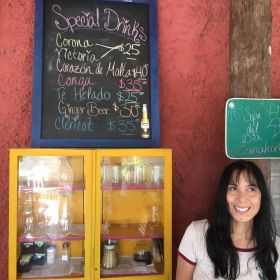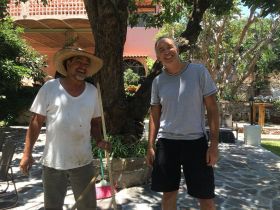How Living Abroad Can Reduce Your Stress
 Would you like to reduce your stress?
Would you like to reduce your stress? Based on the hundreds of expats we've interviewed and the more than one thousand who participated in our studies, if you are like them, there is more than an 80% chance you could reduce your stress by moving abroad. As proof, first we'll provide the results from a survey we conducted about living in Panama, Belize and Nicaragua, in which we asked expats "What is your level of stress in your home abroad?":
A lot less: 60.5%
A little less: 22.9%
About the same: 11.5%
A little more: 2.5%
A lot more: 2.5%
.jpg)
In a soon to be published study, we asked expats living in Mexico the same question, with remarkably similar results:
A lot less: 60.7%
A little less: 22.2%
About the same: 12.5%
A little more: 3.1%
A lot more: 1.6%
Given that lowering stress levels can be so important to one's overall health and happiness, let’s consider why the majority of our respondents said it was so much less stressful to live abroad.
We can break stress into three components:
Genetic—or just how we were born.
Environmental— what, objectively is happening around us. As an example, if we are being chased by a lion, that an objectively stressful situation.
Attitude -- how much we allow the previous two components to affect us.
(1).jpg)
We will leave the genetic component to others more qualified to discuss it, with the stipulation that we probably can’t do much about it. We can, however, change a portion of the environmental component through where we choose to live, and we can change the attitude component, which, on net, is easier abroad, for reasons I’ll describe below.
Regarding environmental stressors, there’s no doubt that, for most people, change is stressful, and there can be a good amount of stress in moving to a new country. Many expats tell us, however, through the studies and interviews we conducted, that after they got over the initial issues of the differences in living abroad and the stress that doing so creates, their stress tended to decrease compared with their home country. Here are some of the reasons they gave us.
Lower Cost of Living
 All other things being equal, the less it costs to maintain or even elevate your lifestyle, the less stress you will have. Money issues are stressful.
All other things being equal, the less it costs to maintain or even elevate your lifestyle, the less stress you will have. Money issues are stressful. Here’s how the contributors to our site compared the cost of living abroad. In general, the differences can be substantial. In my own experiment, I reported that my family spent 62% less. I can also personally report that each percentage point (each and every 62 of them) reduced my stress.
Jewel Hoff, formerly from Las Vegas and now living in Matagalpa, in the highlands of Nicaragua put it simply. “When I fill up the trunk of my car with fruits and vegetables for $18, I’m not stressed. When you pay your rent for a 3-bedroom, 2-bath, brand new home with hot water for $200 a month, you’re not stressed.”
You May Not Have to Work
(1).jpg) For many people, work can be stressful. Given the potential for a lower cost of living abroad (see section just above), many expats could quit work or, in a move that reduced stress even more, many unemployed expats stopped looking for work and retired.
For many people, work can be stressful. Given the potential for a lower cost of living abroad (see section just above), many expats could quit work or, in a move that reduced stress even more, many unemployed expats stopped looking for work and retired. Even expats who still worked after moving abroad reported less stress. Bob Hamilton traded life in Canada for one on the island of Ambergris Caye, in Belize. Hamilton told us, “I have friends back home in Nova Scotia in 'suit and tie jobs' who complain about stress. I tell them, ‘I have stress, too, but if I want to get rid of my stress, I go to my office, get a rum and coke, walk 50 feet, and sit under a coconut tree on the beach.’”
Fewer Chores to Do
One of the most stress-reducing bargains available abroad is the cost of household help, with housekeepers and gardeners / handymen generally charging around $3 per hour. (Here’s our article on how much more time expats add to their lives by not doing chores.)
While very few people would consider having to do chores to be as stressful as having to go to work, not having to do chores did reduce our contributors’ stress, primarily because they had more time to do what they wanted and there were fewer domestic conflicts and resentments about whose turn it was, for example, to mop the floor.
The Culture of a Lower Stress Response and General Acceptance
Each of the countries we cover is known to have a bit of a “manana” attitude, even Belize (where the official language is English). This is one of the few areas where living abroad can be more stressful rather than less, for example, when the repairman didn’t show up on time… or at all.
(3).jpg)
Some of those with the attitude to just accept the manana culture were able to turn this stress into a benefit. David Berger, from Chicago, now lives in Belize. “If you are worried about having high speed internet 24 hours a day, you might go crazy here because there are times that we don’t have it, but we just do not worry about it. When the Internet is down, we just go swimming in the beautiful sea!”
Most North Americans find it difficult to do this right away, but many do ease into it. This not only reduces their stress if they are the ones who happen to be late (in which case, others don’t seem to mind as much), but they also report that it helped them to prioritize their values and put more focus on items that became more important to them than the .jpg) repairman or Internet, such as investing more time into their friendships and family relationships.
repairman or Internet, such as investing more time into their friendships and family relationships.
.jpg) repairman or Internet, such as investing more time into their friendships and family relationships.
repairman or Internet, such as investing more time into their friendships and family relationships. Expats with the flexibility to adapt their attitude toward stress were by far the most successful. Ryan Wrobel, formerly of New York and now practicing law in Belize, told us, “Things move slower, but that can actually be a positive thing. There’s not that frantic rush, high-paced lifestyle that might exist in some of the bigger cities in the US, and that’s a good thing. It’s good for your body. It’s good for your mind.”
In addition, we have repeatedly heard about how the culture abroad can be less judgmental and more accepting of a diversity of actions and results, which reduces the stress of feeling the need to conform. Alfonso Galindo, who used to live in California and now makes his home in Mexico, told us, “We have more of a ‘live and let live’ culture here in Mexico. What you want to do and how you want to do it, other than harming others, is your business. This takes off a lot of pressure to be like everyone else and the constant striving for more and more material success that one feels in the US.”
Less Materialism and How Less Can Be More

While some expats are stressed out by not having enough choices of things to buy in certain areas (some areas more than others), other expats have reported that they are happy with fewer options, which they saw as a benefit. There were fewer things to buy, so why stress about going to get them? Alternative enjoyments such as the sea is there for everyone, and it’s free.
Quite a few expats told us that because of observing and interacting with locals who had much less materially than they did and yet they seemed to be just as happy, they concluded that more material goods did not necessarily increase one’s happiness. As a result, they became less materialistic themselves, which made them even less stressed… and happier.

Mark Leonard, who used to live in New Jersey and California and now lives in Corozal, Belize said, “For Belizeans, it’s not like, ‘I need to have this, I need to have that.’ In a wedding here, you could wear shorts and sandals. There are zero demands put on you by the culture here in Belize, compared to the demands put on you by the culture in the US.”
Healthcare is Available and Inexpensive
How many people in the US are stressed and worried about having to pay for a large healthcare expense or live in fear of getting sick, because their deductible is so huge? I reported personally on my own healthcare experiences here in Mexico, which I found to be extremely stress reducing for me. With the same or better quality, I went from health insurance costing more than $1,000 per month with a .jpg) $10,000 deductible in the US to $250 per month with a $3,000 deductible in Mexico; I went from doctor visits for $100+ in the US to $20 in Mexico; and dental visits were reduced from $130 to $30. Besides putting more than $700 in my pocket each month in lower insurance premiums (very stress reducing), I know that if I have a serious medical issue, it will not bankrupt me. Compared to the alternative, I find that thought relaxing.
$10,000 deductible in the US to $250 per month with a $3,000 deductible in Mexico; I went from doctor visits for $100+ in the US to $20 in Mexico; and dental visits were reduced from $130 to $30. Besides putting more than $700 in my pocket each month in lower insurance premiums (very stress reducing), I know that if I have a serious medical issue, it will not bankrupt me. Compared to the alternative, I find that thought relaxing.
.jpg) $10,000 deductible in the US to $250 per month with a $3,000 deductible in Mexico; I went from doctor visits for $100+ in the US to $20 in Mexico; and dental visits were reduced from $130 to $30. Besides putting more than $700 in my pocket each month in lower insurance premiums (very stress reducing), I know that if I have a serious medical issue, it will not bankrupt me. Compared to the alternative, I find that thought relaxing.
$10,000 deductible in the US to $250 per month with a $3,000 deductible in Mexico; I went from doctor visits for $100+ in the US to $20 in Mexico; and dental visits were reduced from $130 to $30. Besides putting more than $700 in my pocket each month in lower insurance premiums (very stress reducing), I know that if I have a serious medical issue, it will not bankrupt me. Compared to the alternative, I find that thought relaxing. I have spoken to several Canadians who were so stressed about not being able to get a test or surgery done soon enough in Canada on their “free” healthcare plan that they traveled to Mexico or Panama to have it done right away and paid out of pocket. Want that diagnoses or surgery right away, instead of waiting months or even years? Most likely, that ability and control over important issues in your life would reduce your stress.
Better Weather
.jpg) Not all places abroad have better weather than all places in the US or Canada. However, many do, which is one of the reasons people from the areas with worse weather move abroad. For those who find better weather abroad, the removal of stress relating to shoveling snow or having to stay inside during the hot / muggy / or insect season is a nice, relaxing break.
Not all places abroad have better weather than all places in the US or Canada. However, many do, which is one of the reasons people from the areas with worse weather move abroad. For those who find better weather abroad, the removal of stress relating to shoveling snow or having to stay inside during the hot / muggy / or insect season is a nice, relaxing break. More Healthy Habits
Perhaps because they’re less stressed in other areas and to a certain extent because they tend to walk more, lots of expats have reported to us that after moving abroad, they ate better and many lost significant weight.
Texan Linda Jensen, now living in Boquete, Panama, said, “My husband Arne and I didn’t get enough exercise in Texas. Now, we walk everywhere in Boquete, because it’s so convenient and because the weather’s so nice. There’s so much fresh fruit and vegetables available that taste so good and are so inexpensive, that we’re eating better, too. Our health is much better and our stress is much less here.”
 Conclusion
Conclusion Would moving abroad reduce your stress? No one can say for sure what would happen for any individual person, and there are certainly are people who have experienced the opposite reaction, and had their stress levels increase. But what we can say is that, with the right attitude, moving abroad could help reduce your stress… and it certainly worked for the vast majority of respondents to our survey.
Former Californian Irma Quiroz-Yuque summed it up nicely when describing her life in Belize. “I enjoy my time swaying on the hammock on the front porch looking at the view of the water, listening to the birds and animals. It’s been more of a stress-free, relaxing type of lifestyle here in Belize compared to the States. We don’t have the noise, the congestion of the freeways, or of the roads close by. It’s not as big as population so you don’t have as many cars on the roads. It’s so carefree. We’ve made many friends, including the local people. It’s just a different type of lifestyle but a very nice and natural lifestyle. It’s healthier. We’re happy.”
See links to all Mexico road trip stories below. You are currently reading the one highlighted with the yellow background.
To see hundreds of questions answered by expats already living in Mexico, click here.
To see hundreds of questions answered by expats already living in Mexico, Panama, Belize, Nicaragua and Portugal, go here and navigate to the place you're most interested in.
Sign up for the Best Places in the World to Retire newsletter. To see additional additional pictures and videos not in the stories, follow us on Facebook. To see more videos of the trip, see our YouTube channel.
Want online, interactive help finding the best place abroad for you? Try the Location Advisor.
To download free research studies conducted with over 1,000 expats currently living in Mexico, click here.
Download the free eBook of all the stories below, "Our Year on the Road & Living in Mexico-- Adventures, Challenges, Triumphs, Lessons Learned"
Links to Mexico Road Trip stories:
Editor’s note: you may freely reprint the article above, provided you put this at the beginning or end:
Content provided by Best Places in the World to Retire, which provides credible answers to questions about moving abroad, expat stories, and a location advisor to help you find the perfect place for you.
Content provided by Best Places in the World to Retire, which provides credible answers to questions about moving abroad, expat stories, and a location advisor to help you find the perfect place for you.



.png)